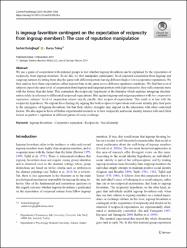| dc.contributor.author | Koloğlugil, Serhat | en_US |
| dc.contributor.author | Tekeş, Burcu | en_US |
| dc.date.accessioned | 2020-02-20T03:52:31Z | |
| dc.date.available | 2020-02-20T03:52:31Z | |
| dc.date.issued | 2021-12 | |
| dc.identifier.citation | Koloğlugil, S. & Tekeş, B. (2021). Is ingroup favoritism contingent on the expectation of reciprocity from ingroup members?: The case of reputation manipulation. Current Psychology, 40(12), 5899-5908. doi:10.1007/s12144-019-00529-x | en_US |
| dc.identifier.issn | 1046-1310 | |
| dc.identifier.issn | 1936-4733 | |
| dc.identifier.uri | https://hdl.handle.net/11729/2257 | |
| dc.identifier.uri | http://dx.doi.org/10.1007/s12144-019-00529-x | |
| dc.description.abstract | We use a game of cooperation with minimal groups to test whether ingroup favoritism can be explained by the expectation of reciprocity from ingroup members. To do this, we first manipulate participants’ level expected cooperation from ingroup and outgroup partners by letting them play the game with different partners having different (high or low) cooperative reputations. We then analyze how these expectations affect ingroup bias in the game across different reputation conditions. We find that even if subjects expect the same level of cooperation from ingroup and outgroup partners with high reputation, they still cooperate more with the former than the latter. This contradicts the reciprocity hypothesis in the literature which explains intergroup discrimination solely in reference to differential reciprocal expectations. But, against ingroup and outgroup partners with low cooperative reputation, subjects’ level of cooperation almost exactly parallel their reciprocal expectations. This result is in line with the reciprocity hypothesis. We explain these findings by arguing that both reciprocal expectations and social identity play their parts in the emergence of ingroup favoritism, but that their relative strengths may depend on the interaction with other contextual factors. We also argue in favor of further experimental research as to how reciprocity and social identity interact with such third factors as partner’s reputation in different games of social exchange. | en_US |
| dc.language.iso | eng | en_US |
| dc.publisher | Springer | en_US |
| dc.relation.isversionof | 10.1007/s12144-019-00529-x | |
| dc.rights | info:eu-repo/semantics/closedAccess | en_US |
| dc.subject | Cooperative reputation | en_US |
| dc.subject | Ingroup favoritism | en_US |
| dc.subject | Intergroup relations | en_US |
| dc.subject | Reciprocity | en_US |
| dc.subject | Research | en_US |
| dc.subject | Social identification | en_US |
| dc.subject | Social identity | en_US |
| dc.title | Is ingroup favoritism contingent on the expectation of reciprocity from ingroup members?: The case of reputation manipulation | en_US |
| dc.type | article | en_US |
| dc.description.version | Publisher's Version | en_US |
| dc.relation.journal | Current Psychology | en_US |
| dc.contributor.department | Işık Üniversitesi, İktisadi ve İdari Bilimler Fakültesi, Ekonomi (İktisat) Bölümü | en_US |
| dc.contributor.department | Işık University, Faculty of Economics and Administrative Sciences, Department of Economics | en_US |
| dc.contributor.authorID | 0000-0002-2399-4349 | |
| dc.identifier.volume | 40 | |
| dc.identifier.issue | 12 | |
| dc.identifier.startpage | 5899 | |
| dc.identifier.endpage | 5908 | |
| dc.peerreviewed | Yes | en_US |
| dc.publicationstatus | Published | en_US |
| dc.relation.publicationcategory | Makale - Uluslararası Hakemli Dergi - Kurum Öğretim Elemanı | en_US |
| dc.contributor.institutionauthor | Koloğlugil, Serhat | en_US |
| dc.relation.index | WOS | en_US |
| dc.relation.index | Scopus | en_US |
| dc.relation.index | Social Sciences Citation Index (SSCI) | en_US |
| dc.description.quality | Q2 | |
| dc.description.wosid | WOS:000574653700002 | |



















